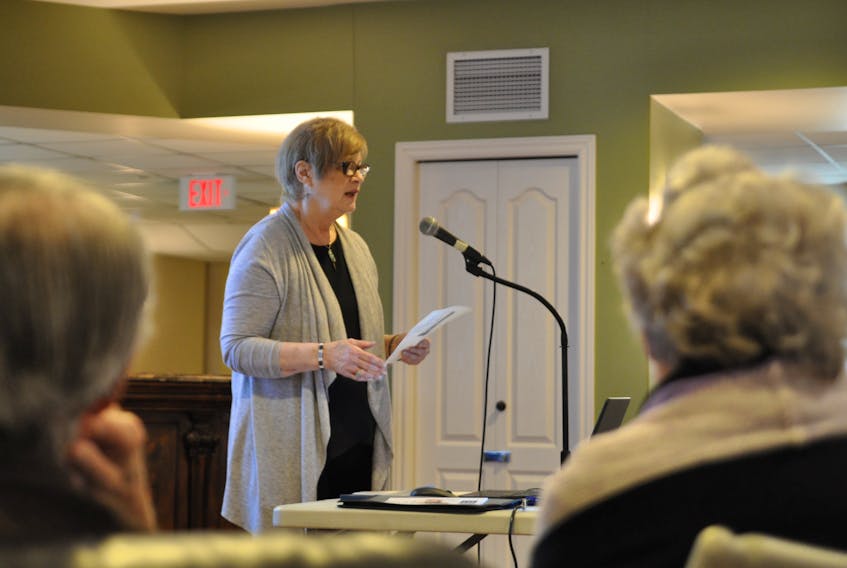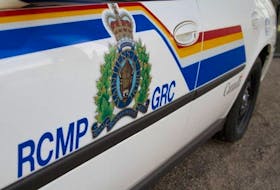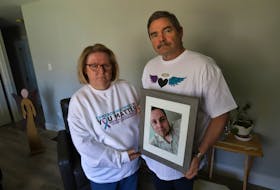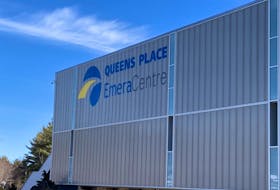KENTVILLE, N.S. – An Annapolis Valley social worker says that while seniors are at risk of depression, it is an illness that can be treated if they are willing to seek help and talk openly about it.
Pam McKinley is a co-ordinator and clinical social worker with the Mental Health and Addictions Services’ Seniors Mental Health Team in the Annapolis Valley.
She recently presented to residents at Kings Riverside Court in Kentville about why could be at risk of developing depression, and how getting help and talking about mental health are both critically important.
She said seniors are often at risk of depression due to factors such as loneliness, chronic illness and pain, a loss of independence and a feeling of lacking purpose.
She added that stigma “hits this older generation particularly hard” because they were raised to ignore such feelings and continue on with their lives.
“That’s part of the stigma, the view that ‘you can just snap out of this.’ Back when folks in their 80s and 90s were being raised, you didn’t talk about that – you just ‘pulled up your boot straps,’” said McKinley.
“But that is changing, and it needs to change. Talk openly, educate yourself and choose empowerment over blame – ending the silence and finding your voice helps normalize all of this.”
Find your voice
A Kings Riverside Court resident, who did not want her name published, attended the presentation and spoke with other residents about her own history with depression.
She said seeking treatment, along with an open dialogue, greatly helped her manage it and she later added that the social interaction she’s had with other residents, coupled with now living closer to her family, has been “huge.”
“My son says he feels, even in my tone of voice, coming here has changed my whole attitude. A lot of times it’s just about listening to other people, being with them – you don’t feel a stranger here, you don’t feel lost,” she said.
McKinley said any senior’s first step when identifying depression or seeking help is to see their doctor to request a referral to mental health services.
John Moore, manager with Adult Mental Health and Addictions for the Annapolis Valley, confirmed this.
“It works best if (the) first stop for mental health needs are with the primary care provider,” he said, adding that the patient can then be referred to a specialist for assessment and a potential diagnosis.
With many Annapolis Valley residents still without a family doctor, Moore said people can also obtain referrals at a walk-in clinic or by calling the self-referral phone line at the Annapolis Valley Mental Health and Addictions Services line - 1-855-273-7110.
Moore said he “would assume” patients would be able to obtain a referral from a physician or nurse practitioner at a walk-in clinic “as easily” as with a family doctor.
“I would think no matter the setting that the doctor or nurse would facilitate that transition of care,” he added.
Moore said the primary issue is “growing the service to meet the demand.”
“It’s sometimes challenging to meet everyone’s needs.”
Life can ‘feel better’
Moore did not confirm the number of people currently waiting to be seen through mental health services.
Several seniors at the Kings Riverside presentation also expressed their own difficulties with navigating the province’s mental health system, something Moore said, “is not a new issue.”
“I think for multiple reasons people have difficulty navigating health-care services, or social services. We want to try and make it as simple and user-friendly as possible, and a comfortable experience and ensure they know how to reach out to us,” he said.
“There is always room for improvement and learning, and we continually strive to make things more accessible and easier to navigate.”
As her presentation drew to a close, McKinley emphasized the need to reach out and speak with people – whether a medical professional or a friend – about struggles with mental health to normalize the issue.
She said once people realize that mental illness is quite common, and something many people face, people will become more vocal about their own experiences and “realize how important mental health is.”
“I think mental health is such an important aspect of our health. It’s all connected, and when one part of us is off, it effects every other part of us. It’s almost the last frontier in health research,” she said.
“Life can be better and can feel better – that’s the message here. But people have to talk about it.”
A list of mental health resources in the Annapolis Valley can be found here: http://kingsns.cmha.ca/wp-content/uploads/2018/11/Mental-Wellness-Helping-Tree-November-2018.pdf
If you are in crisis, or know someone who is, call the Mental Health Crisis Line at 1-888-429-8167 (toll-free). The service is available 24 hours a day and seven days a week.
Mental Health and Addictions services in the Annapolis Valley can be reached at 1-855-273-7110.
A list of mental health resources in the Annapolis Valley can be found here: http://kingsns.cmha.ca/wp-content/uploads/2018/11/Mental-Wellness-Helping-Tree-November-2018.pdf
If you are in crisis, or know someone who is, call the Mental Health Crisis Line at 1-888-429-8167 (toll-free). The service is available 24 hours a day and seven days a week.
Mental Health and Addictions services in the Annapolis Valley can be reached at 1-855-273-7110.
MORE INFORMATION:
The following services are listed as available for seniors in the Annapolis Valley:
Seniors Safety Program
- Annapolis County Seniors' Safety Program Association
- Kings County contact is 902-375-3602, [email protected].
- Annapolis County contact is Annapolis County 902-665-4481, [email protected]
- General website: https://novascotia.ca/seniors/senior_Safety_Programs.asp
Government of Nova Scotia
- Continuing Care Programs,
- 1-800-225-7225
- Website: https://novascotia.ca/dhw/ccs/
- Department of Seniors
- 1-844-277-0770
- Website: https://novascotia.ca/seniors/
Senior Abuse Line
- 1-877-833-3377
Alzheimer Society
- 1-800-611-6345
A full list of mental health services for Kings and Annapolis counties can be found online at http://kingsns.cmha.ca/wp-content/uploads/2018/11/Mental-Wellness-Helping-Tree-November-2018.pdf
If you are without a family doctor:
The following is a statement from the Nova Scotia Health Authority:
“Nova Scotians who are without a primary care provider are encouraged to add their names to the Need a Family Practice Registry, either online at needafamilypractice.nshealth.ca or by calling 811, Monday through Friday, 10 a.m. to 6 p.m. People on the registry are assisted in chronological order. When we are aware of practices that are accepting new patients, lists of names from the registry are provided to practices.
There are several options for Nova Scotians to access care:
- By calling 811 for health care advice from a registered nurse, available 24-7
- By visiting a walk-in clinic
- For more urgent health concerns, visiting the nearest emergency department or calling 911.”
Source: Mental Wellness Helping Tree, Nova Scotia Health Authority (last updated Nov. 2018)
RELATED:
- VIBERT: Nova Scotia's Liberals bar doctors from health committee
- 'We're hoping this acts as a magnet': Doctors hopeful new health centre in New Minas will help with recruitment
- Wolfville doctor on frontlines of physician shortage worried about broken system
- 'We shouldn't have to wonder': Doctor shortage hits home in Annapolis Valley
- Seven family physician vacancies open in Kings, Annapolis counties
- Mental health movement says province's system needs a change









